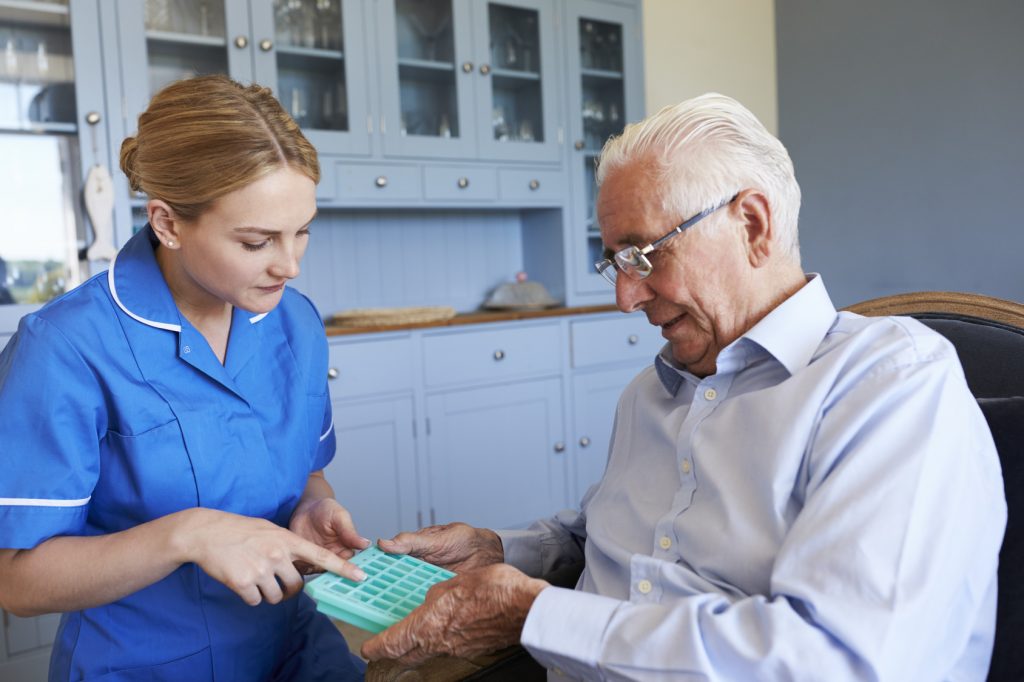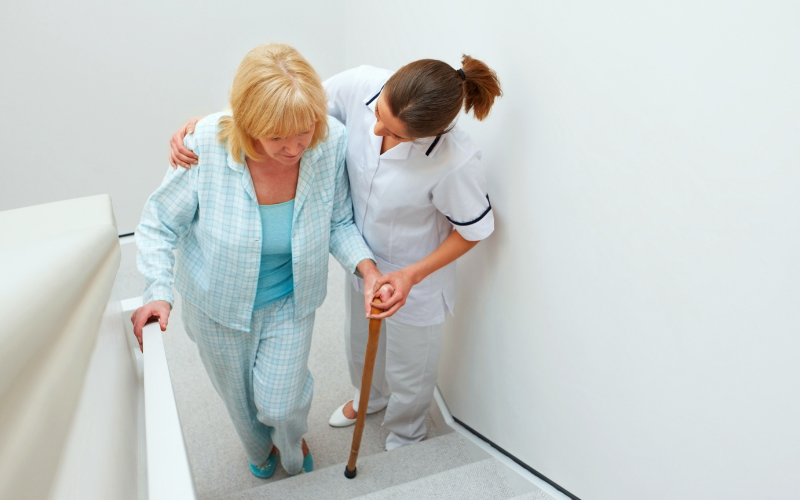
Diabetes is a prevalent condition that affects people young and old. National Diabetes Month raises awareness of this disease that impacts millions of Americans. Each November, it’s important for seniors, families, and communities to show their support in fighting this disease.
What is diabetes?
A chronic condition, diabetes occurs when blood sugar is too high. The body fails to produce enough insulin (a hormone produced by the pancreas) or is unable to use insulin properly. Glucose (aka blood sugar) does not reach the cells but stays in the blood.
Diabetes can cause additional health problems. People with diabetes have a higher risk of damage to their kidneys, heart, eyes, and nerves. The condition is also linked with certain types of cancer. Older adults can be affected by different types of diabetes, such as type 1 or type 2 diabetes.
Children and young adults are more likely to develop type 1 diabetes, although it can appear at any age. In type 1 diabetes, the body makes insufficient insulin or no insulin at all—leading to a lifelong need to take insulin every day.
Type 2 diabetes can also appear at any age but is more likely to occur when people have certain risk factors, like obesity or a family history of the disease. The body fails to use insulin properly, thereby keeping the blood sugar level outside the normal range.
How common is diabetes in seniors?
The American Diabetes Association (ADA) reports that the prevalence of diabetes among seniors is high. According to the ADA, 16.5 million elderly individuals live with diabetes, diagnosed or undiagnosed. In fact, 1 in 4 diabetics do not know they suffer from the disease.
Given that 1 in 3 people aged 65 and older have diabetes, it’s essential that seniors and their families learn all they can to prevent or manage this condition. While diabetes has no cure, it can be managed by exercise, eating nutritiously, maintaining a healthy weight, monitoring, and medication.
What is National Diabetes Month?
National Diabetes Month is observed each November. The goal of this month is to increase awareness of diabetes, educate people about how the disease affects the body and learn ways to prevent it. In 2024, the focus of National Diabetes Month is prevention.
National Diabetes Month has its roots in National Diabetes Week, which was announced by the Reagan administration in 1981 to raise awareness of the 35,000 people who died each year from the disease. A little over a year later, in 1982, President Reagan proclaimed November to be National Diabetes Month.
How do seniors celebrate National Diabetes Month?
1. Share Stories
Along with managing their own health, the elderly are urged to show their support during National Diabetes Month. Sharing personal stories about their life with diabetes takes courage but it can have a lasting and meaningful impact on someone else battling the disease.
2. Participate in Events
Active seniors might join the ADAs Step Out Walk to raise funds for diabetes research and show their support for all people living with diabetes. The ADAs Tour de Cure is a cycling event intended to raise funds for diabetes research.
Participating in ADA events unifies individuals and creates a shared purpose in the fight to end diabetes. Walking among thousands of other participants nationwide increases awareness, connects communities across the country and contributes to the prevention and management of diabetes.
3. Find Ways to Give
Seniors might consider making donations to the ADA to help people with diabetes. Gifts may be included in wills and trusts. Or, for those aged 70½ and older, make a Qualified Charitable Distribution from an IRA. Monthly donations also make a difference in the mission to end diabetes.
How do seniors remain proactive about their health?
During National Diabetes Month, the elderly are urged to take charge of their health and become educated on their risk for developing diabetes. This month is an ideal time to start making lifestyle changes to either prevent or manage diabetes effectively.
1. Take the Risk Test
The ADA offers a simple, easy-to-use diabetes risk test online. One minute is all it takes for seniors to assess their risk. Older adults can either take the 60-second test for themselves or someone they know. Remember—most Americans with prediabetes don’t know they have it.
2. Draw Blood Annually
An annual blood test helps to manage a senior’s risk for diabetes. The blood test should provide results for A1C (measures blood sugar levels over the past 2-3 months), blood sugar, and cholesterol. Also keep track of blood pressure, BMI (body mass index), and weight to maintain overall health.
3. Practice Healthy Habits
Eating certain foods can help a senior lower their risk of developing diabetes. These foods include leafy greens, fatty fish, Greek yogurt, berries, and nuts. Older adults should receive quality sleep each night. Manage chronic health issues and stop unhealthy habits, like smoking.

Nurse Helping Senior Man To Organize Medication On Home Visit
Seniors can take steps to improve their health during National Diabetes Month. Assisting Hands Home Care is ready to support their goal of making healthy lifestyle changes to prevent or manage diabetes. We provide compassionate in-home elder care to support seniors with daily activities.
When our aging care recipients have a doctor’s appointment for an annual blood test, for instance, we provide safe transportation and escort to the medical office. We also give timely medication reminders if seniors are on diabetes drugs. Caregivers assist with hygiene tasks, like bathing, toileting, and dressing.
Caregivers prepare nutritious meals so that seniors eat healthy. We’re pleasant companions who keep loneliness and boredom at bay with light conversations, card games, outings, and leisure activities. Fall prevention is a critical part of our duties; we remove fall hazards to promote safety.
Whether or not your aging loved one lives with diabetes, families are encouraged to consider the flexible care options from Assisting Hands Home Care. We serve the elderly in Coppell, TX | Dallas, TX | Highland Park, TX | Richardson, TX | University Park, TX, with dedication. Call us today at (214) 760-6944 to schedule a free in-home consult today and learn more about quality senior home care.







